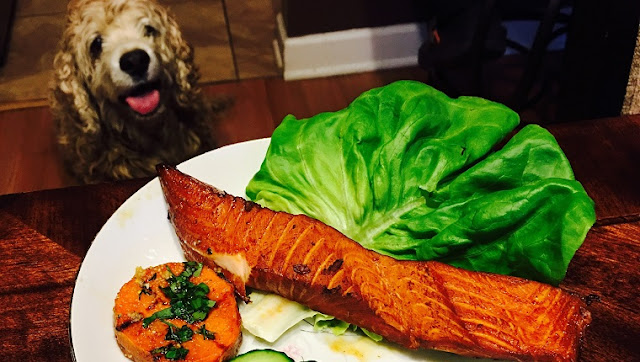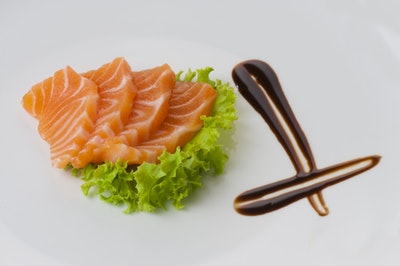Can Dogs Eat Salmon? Is Salmon-Safe For Dogs?
 |
| Can Dogs Eat Salmon? Is Salmon-Safe For Dogs? |
Is It Safe To Feed My Dog With Salmon?
The short answer is yes. Salmon is an excellent source of omega-3 fatty acids, which support the immune system, can decrease inflammation and keep your dog's coat healthy and glowing. It is also a good source of protein. In fact, salmon is a common ingredient in high-quality dog food. If your dog is allergic to more common protein sources, such as chicken, salmon may be a good alternative.How Should I Prepare Salmon For My Dog?
Never give your dog raw or undercooked salmon. It may contain the parasite Neorickettsia helminthoeca, responsible for salmon poisoning. This disease can be fatal. Besides, raw salmon contain many small, brittle bones that can smother your dog or lodge in his stomach or intestines.However, well cooked and boneless salmon is definitely on the list of approved dog foods. Choose boneless fresh fillets because they are less likely to have small bones. But be sure to check any tiny bones before cooking. Then poach, grill, roast, steam or cook salmon without oil, salt, pepper, or other seasonings, such as garlic or onions.
As with any food, portion control is important. Give your dog a proper serving and limit his consumption of salmon to once a week or less. You can even feed your canned dog with salmon, although it is better to choose a salmon-filled with water.
Salmon is a healthy and delicious fish option to eat for us. But is it that our beloved dogs eat too?
The quick answer is yes. The dogs can eat salmon and it is generally good for them if they are well served. Many good fish for humans are also safe for dogs. But there are some important facts you need to know before you simply make them a bowl of salmon.
Of course, you should also consult your veterinarian before sharing any human food with your dog, including salmon.
Here's what you need to know about salmon feeding in dogs.
What Are The Benefits Of Salmon For Your Dog?
 |
| Can Dogs Eat Salmon? Is Salmon-Safe For Dogs? |
Salmon is a saltwater fish from the oceanic waters of Alaska, the Pacific Northwest, and the California coast. It is a ray-finned fish that belongs to the salmonid family. They are related to trout, arctic char, gray shadows, and whitefish.
It is a popular dish that contains a lot of nutrients. It is fat and can help reduce the risk of many diseases. It is also a very versatile fish that can be prepared in many ways for you and your dog.
Salmon contains many dense nutrients that can be beneficial to your dog's health. For example, it is rich in eicosatetraenoic acid (EPA) and docosahexaenoic acid (DHA), two long-chain omega-3 fatty acids. Here are some of the benefits of drinking EPA and DHA for your puppy:
1. Regulates the immune system
2. Can reduce inflammation leading to conditions such as arthritis
3. Improves the health of your dog's coat and skin
4. Can help prevent some skin allergies in your dog
5. Helps with inflammatory bowel disease
6. Helps to produce more collagen in the dog's system
7. Can help brain development of fetuses of pregnant bitches
8. Can fight heart disease and lower blood pressure and triglycerides
9. Helps to slow the growth of cancer cells
10. Promotes healthy weight loss in overweight dogs
11. Provides support to dogs with kidney failure
12. Improves cognitive function in older dogs
13. Helps reduce joint problems in older dogs
In addition to the Omega-3 fatty acids EPA and DHA, salmon also contains vitamins A, D, and B, as well as healthy minerals such as zinc, potassium, and magnesium.
What Are The Risks Of Salmon For Your Dog?
As with all foods for your dog, everything should be moderate. And you should always ask your veterinarian before changing your dog's diet. But the most important thing to consider when feeding your dog is the way he is prepared.
DO NOT feed your dog raw or undercooked salmon. Raw salmon may contain parasites and bacteria, including a parasite called Neorickettsia helminthoeca. This parasite can cause salmon poisoning in your dog and can be fatal.
Some of the signs of salmon poisoning in dogs are:
1. fever
2. Vomiting and diarrhea
3. Decreased appetite
4. Weakness and lethargy
5. depression
6. Extreme weight loss
7. dehydration
8. Swelling of the lymph nodes
9. Discharge from the eyes and nose
Diseases and symptoms may vary. Therefore, if you notice any of these signs in your dog, be sure to bring them to the veterinarian immediately. The sooner your dog receives proper treatment, the greater his chances of survival.
In addition to raw or undercooked salmon, this fish contains many fragile bones. Make sure that the salmon you feed with your puppy is boned to avoid choking or damaging the digestive system.
Besides, an appropriate portion of salmon for your dog should not exceed 100 grams per ten pounds of body weight. If you want salmon to be a regular part of your diet, it should be enough to feed it once a week to maximize your health benefits.
Is Salmon Good For Dogs? What Are The Benefits?
 |
| Can Dogs Eat Salmon? Is Salmon-Safe For Dogs? |
Despite the dangers described in the previous section, salmon is very rich in healthy proteins, vitamins, minerals, and omega acids. Its various nutritional benefits also make it very beneficial for dogs. For example, the mentioned fatty acids help the immune system, can reduce inflammation and can help the health of your dog's skin and coat. Most types of salmon - raw, cooked, canned (we will get there) - also contain a similar set of other nutrients. For example, calcium. According to the Merck Veterinary Manual, insufficient calcium can lead to irritability and loss of muscle tone.
Besides, potassium is vital for electrical and cellular functions, including the conduction of electrical charges by the nerves, heart, and muscles. As a result, a lack of potassium in the bloodstream will compromise the proper functioning of these tissues.
And of course, vitamin A, which is responsible for vision, growth, immune function, fetal development and cell function in dogs. So salmon can be a great addition to the diet of dogs.
Can Dogs Eat Raw Salmon?
 |
| Can Dogs Eat Salmon? Is Salmon-Safe For Dogs? |
Absolutely not. As mentioned before, it would be dangerous, even if the raw salmon seems to be very nutritious. According to the United States Department of Agriculture research database, 100 g of wild Atlantic wild salmon contain 142 kcal, 19.84 g of protein, 6.34 g of fat (including 0, 98g of "dubious" saturated fats and the rest are "good" poly- and monosaturated) and a whole lot of other nutrients.
I will list the ones that contain the most: 12 mg of calcium, 29 mg of magnesium, 200 mg of phosphorus, 490 mg of potassium, 7.86 mg of niacin, 0.81 mg of vitamin B6, 40 IU of vitamin A And there are some less amazing things in raw salmon too - this includes 44 mg of sodium and 55 mg of cholesterol.
However, if you want to avoid salmon poisoning and avoid filing a major veterinary bill, we recommend you remove it completely.
And if you're still not convinced of the presence of parasites in raw fish, we covered the topic in our article by answering the question "Can dogs eat salmon skin?" And in our article on dogs that eat shrimp. So you can learn more about the topic of raw materials and even watch a short video here.
Dogs Can Eat Cooked Salmon
According to the recipe. Fried next to it (the frying will make the oily fish even fatter, and so very edible for dogs), let's talk about grilled salmon in this section.
According to us Department of Agriculture researchers, 100 g of grilled salmon contain 103 kcal, 18.10 g of protein, 3.45 g of fat (including 0.43 g of dubious saturated fats). And the rest is "good" poly- and monosaturated.). And, of course, other healthy nutrients, including 34 mg of calcium, 86 IU of vitamin A and 1 mg of vitamin C.
Grilled salmon also contains less healthy elements: 190 mg of sodium and 56 mg of cholesterol. So, much less nutrients than in raw fish and also high in sodium. However, if you are grilling a separate small batch so that your dog deliberately skips all the seasonings, it may be a good idea to share the joy of the salmon feast with your puppy.
How To Cook Salmon For Dogs?
 |
| Can Dogs Eat Salmon? Is Salmon-Safe For Dogs? |
Start with the right choice of fish - choose fresh fillets without bones because they are less likely to have small bones. But be sure to inspect the room for small bones as they may pose a choking hazard. If you are sure that the fish is fine - poaching, steaming, grilling, cooking or roasting - salmon without salt, oil, pepper or other seasoning, including the well-known culprits: garlic or onions.
As with any food, controlling portion size is essential. Share a little fish with your dog and limit his salmon consumption to one week or less.
Can Canned Salmon Be Safe For Dogs?
 |
| Can Dogs Eat Salmon? Is Salmon-Safe For Dogs? |
It depends. According to researchers from the US Department of Agriculture, 100 grams of canned salmon include 129 kcal, 19.68 g of protein, 4.97 g of fat (including 0.86 g of saturated fat and the rest being "good" poly- and monosaturated) and other nutrients.
215 mg of calcium, 30 mg of magnesium, 337 mg of phosphorus, 344 mg of potassium, 6.63 mg of niacin, 0.3 mg of vitamin B6, 57 IU of vitamin A, 547 IU of vitamin D, 0.64 mg of Vitamin E, etc. And canned salmon also contains questionable elements - for example, 403 mg of sodium and 55 mg of cholesterol.
Thus, although nutritionally, canned salmon really looks attractive, it contains too much sodium (a medium-sized puppy weighing 30 pounds can not consume more than 100 mg of sodium per day).
Therefore, we recommend that you avoid canned salmon or try a recipe specially designed for dogs, such as Solid Gold Salmonless Chicken Flour. It contains all the benefits of canned salmon + more added nutrients, including a wide range of probiotics for better digestion, vitamin D3 and biotin for better skin and coat and, most importantly, puppies really look great appreciate it.
Can Dogs Eat Smoked Salmon?
Unfortunately, the answer is no. As discovered and documented by US Department of Agriculture researchers, 100 grams of canned salmon contain 117 kcal, 18.28 g of protein, 4.32 g of fat (including 0.93 g of saturated fats and the rest being "good" poly- and monounsaturated). ).
More nutrients - 11 mg of calcium, 18 mg of magnesium, 164 mg of phosphorus, 175 mg of potassium, 4.72 mg of niacin, 0.27 mg of vitamin B6, 87 IU of vitamin A, 685 IU of vitamin D, 1.35 mg of Vitamin E, etc. Probably the largest amount of nutrients we have seen so far.
However, smoked salmon also contains the largest amount of sodium - 672 mg per 100 g serving. Too much for your puppy even if you only share a small piece of fish with your furry friend.
Related Post :
Can Dogs Eat Ketchup

Comments
Post a Comment